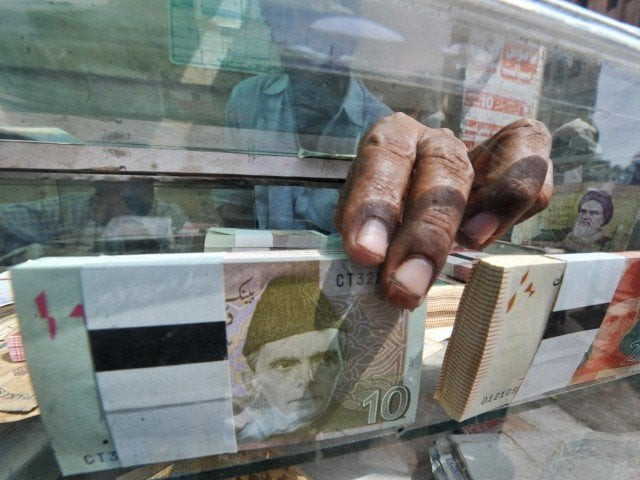Rupee slides to 168.38 in inter-bank market
Gold prices drop in line with international market

The Pakistani rupee hit an all-time low of Rs168.38 against the US dollar in the inter-bank market on Monday on speculation that friendly countries in the Middle East would withdraw their deposits of billions of dollars from the State Bank of Pakistan’s foreign currency reserves.
“Market talk suggests Saudi Arabia and the UAE have demanded that Pakistan return the funds they deposited in the central bank’s foreign exchange reserves (some 20 to 22 months ago),” Next Capital Managing Director Muzammil Aslam said while talking to The Express Tribune.
The uncertainty generated additional demand for the US dollar and cut supply in the inter-bank market. “Importers made some additional buying while exporters avoided selling dollars believing the local currency would lose further ground against the greenback,” he said.
The rupee lost Rs0.50 to Rs168.38 against the greenback in the inter-bank market on Monday. It breached the previous record low of Rs168.30 hit in recent weeks.
Reports suggest the kingdom had demanded that Pakistan return the remaining $2 billion. Earlier, Islamabad has already returned $1 billion to Riyadh out of the total deposits worth $3 billion.
Besides, the kingdom has also suspended the credit line of $3.2 billion, which has resulted in cutting off supplies of petroleum products on deferred payments to Islamabad.
The UAE had also deposited $2 billion in Pakistan’s reserves to help it recover from the financial crisis.
“The grave situation has mounted pressure on the rupee,” Exchange Companies Association of Pakistan (ECAP) President Malik Bostan said.
“The situation emerged after Foreign Minister Shah Mehmood Qureshi sought a meeting of member countries of the Organisation of Islamic Cooperation (OIC) in Islamabad.” Islamabad has been urging Riyadh to summon the OIC meeting to condemn Indian atrocities in occupied Jammu and Kashmir, but the kingdom has maintained silence over the issue.
Initially, Riyadh and Abu Dhabi had deposited funds for one year in late 2018 and early 2019 but later agreed to extend the timeline, while the oil credit line was established for three years with effect from July 2019. In this entire episode, China has once again stepped forward to rescue Pakistan as it has immediately lent $1 billion around the days Islamabad returned $1 billion to Riyadh.
However, the government uttered no official word on the development. “The government should clarify the situation, its silence may make rupee volatile against the US dollar,” Aslam added.
He stated that the rupee should regain ground against the greenback immediately as the situation was not as grim as the market talk suggested. “If Pakistan has partially returned the funds to Riyadh, then Beijing has extended the same amount to Islamabad,” he commented.
“First of all, Pakistan’s relationship with Middle East-based friendly counties has not turned hostile. They are still friends,” he said. “Secondly, Pakistan, which is under the International Monetary Fund (IMF) loan programme, has other options to build its reserves and do away with unnecessary pressure on the rupee. Like, Pakistan may launch Eurobond, Sukuk and opt for short to long-term commercial loans from international markets,” the analyst concluded.
Gold loses shine
The precious metal lost Rs3,000 to Rs129,000 per tola (11.66 grams) in Pakistan in line with the global trend, according to the All Sindh Saraf Jewellers Association (ASSJA).
Gold fell $24 to $2,030 per ounce (31.10 grams) in the international market as investors booked profit at the historic high price.
Had the rupee not depreciated, the drop in gold price had been comparatively higher in the local market.
Pakistan does not produce gold and relies on imports to meet local demand. Accordingly, the rupee-dollar parity and gold price in the world market influence prices in the local market.
Published in The Express Tribune, August 11th, 2020.
Like Business on Facebook, follow @TribuneBiz on Twitter to stay informed and join in the conversation.



















COMMENTS
Comments are moderated and generally will be posted if they are on-topic and not abusive.
For more information, please see our Comments FAQ